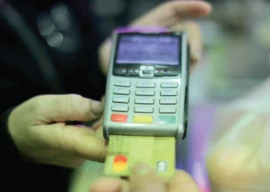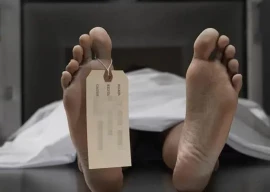
Over two years have passed since the tragic Bhoja Air Flight 213 crashed but the judicial investigation commission has yet to fix responsibility. There seems to be no end in sight for the protracted inquiry as the commercial airline has shut down and its management has ‘gone missing’, claimed an official requesting anonymity.
Their disappearance came to the fore when none of the owners or managers of Bhoja Air presented themselves before a two-member judicial investigation commission that was appointed by the Islamabad High Court (IHC) in July last year.
The high court had formed the inquiry body after several close relatives of the 121 passengers approached the court for financial compensation.
The commission – headed by retired Supreme Court judge Ghulam Rabbani, along with a former Air Vice-Marshal Faiz Amir Siddiqi – was entrusted with the task by the IHC to investigate the cause of the Bhoja Air crash near Islamabad on April 20, 2012 and fix responsibility for the accident that took the lives of 127 passengers including six crewmembers.
Justice (retd) Khalil Ramday was heading the commission but he later refused to be a part of the investigation. A technical member of the inquiry body also quit the job after some time.
The actual process of the investigation began in January when Justice Rabbani took charge.
As a first step towards the investigation process, the commission, through a public advertisement, directed all the officials concerned to appear before it to join the investigations. Owner and management of Bhoja Air, the Pakistan Civilian Aviation Authority (PCAA), Capital Development Authority, the Islamabad police chief, ministries of defence and interior, and relatives of the deceased were among those invited.
However, Bhoja Air chairman Farooq Bhoja and CEO Arshad Jalil failed to step up or even show up.
“During the investigation it came to the commission’s knowledge that the owners of Bhoja Air have shut down their air carrier and sold their aircraft to another party,” the official said.
PCAA should be held responsible for this decision to close its commercial air company in a suspicious and hushed way, he maintained. “The owners of the airline could not sell their aircraft without the PCAA’s approval as they were under investigation by the commission.”
Abid Qaimkhani, the regulatory body’s spokesperson, told The Express Tribune that Bhoja Air offices were shut down by its management after CAA suspended its licence. He did not know whether the management had sold its assets during the judicial inquiry or not.
Qaimkhani was also unaware about why the airline’s management did not appear before the commission to answer questions.
According to another official, the whereabouts of CEO Arshad Jalil were unknown to the commission, while Farooq Bhoja could not appear on medical grounds.
Nevertheless, their deliberate absence not only hampered the investigation but it also caused a long delay in finalising the probe report. The IHC has extended the final date twice for the commission to submit it. Now the inquiry body will present the report on June 15, enabling IHC to initiate action against those found responsible, said an official familiar with the commission’s proceedings.
It would have been for the first time in the country’s history that officials responsible for an air crash would be dealt with.
According to initial media reports, the deceased pilot and the first officer of the ill-fated flight were not adequately trained, which allegedly was a major cause of the crash. As per PCAA rules, it is mandatory for the airline management to hire trained pilots or ensure up-to-the-mark training is provided to existing pilots.
The commission was also mandated by the IHC to investigate whether the PCAA had ensured the implementation of its rules and set procedures in Bhoja Air’s case.
PCAA, being a regulatory organisation, is bound to guarantee the implementation of its rules and procedures by airlines and their pilots.
But officials and analysts claim that PCAA had ‘miserably failed’ in fulfilling its duties. The Bhoja airliner carrying 121 people and six crewmembers, which flew from Karachi to Islamabad, crashed in the outskirts of the capital at 6:46 pm on April 20, 2012. There were no survivors.
Read our story on the cockpit crew conversation and findings of a CAA investigation report here.
Published in The Express Tribune, May 28th, 2014.
COMMENTS (8)
Comments are moderated and generally will be posted if they are on-topic and not abusive.
For more information, please see our Comments FAQ


1731570357-0/elon-musk-(1)1731570357-0-165x106.webp)
-(1)1717678110-0/Kendrick-(1)-(1)1717678110-0-165x106.webp)













What makes people think they will get any compensation from Bhoja when he refused to pay ransom to free his son from kidnappers. And his son was killed. Some claim it was a botched rescue operation. Only God knows the truth. I would have thought that after that tragic incident in his life, Bhoja would have become god fearing.
Who ever bought the aircrafts from Bhoja, they should be brought to court and all the aircrafts confiscated and sold so that the victims' heirs could be compensated. This is corruption at its peak and desecrating the victims of the air crash. Isn't the CAA the authority to look over such deals?
Mr. Arshad Jalil will be coming to UAE in month of Ramadan since he's enjoying summers in UK these days. Want his whereabouts ? contact details ?
Even after sixty-seven years, Pakistan remains a 'headless chicken' searching NOT for a way out of the mess but for MORE illegal money. How come these people got away when their aircraft crashed and 127 on board persons lost their lives? Salams
Pakistan Civil Aviation is part if the problem, instead of playing role of a regulator. Bhoja Air was facilitated to sell its aircrafts by CAA and it's CEO is living in UAE. Why cannot the GOP issue red warrants to get Arshad Jaleel, a dual national arrested?.
Only in Pakistan ..
They must be searched. How can they disappear?